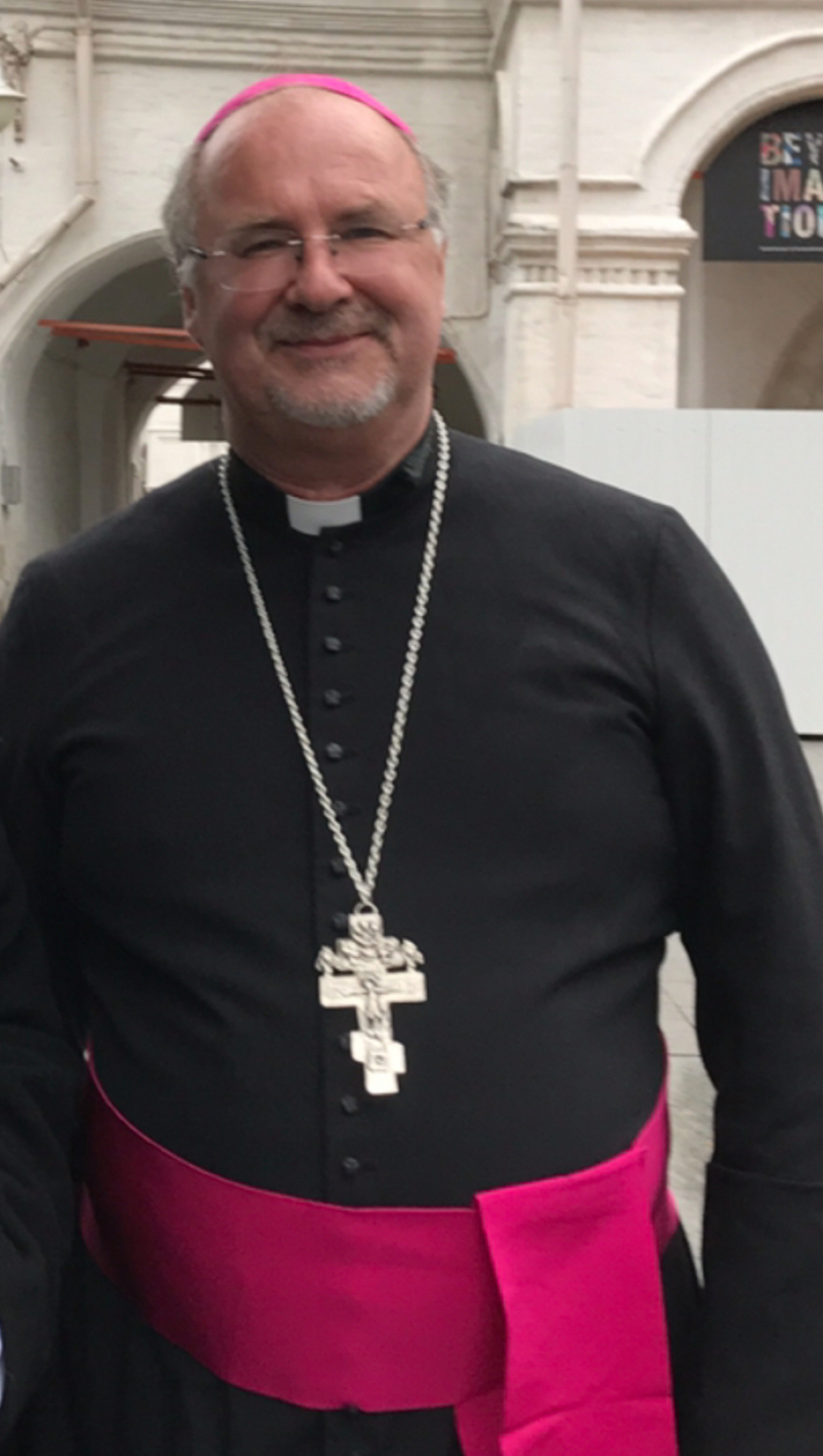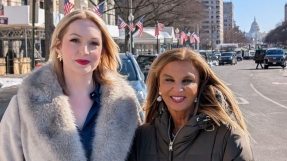
Gavin Ashenden, the Anglo-Catholic priest who was a chaplain to the Queen from 2008 until he resigned earlier this year, was consecrated a bishop in 2013 while he was still a chaplain to the Queen, Christian Today can reveal.
Ashenden was consecrated as a missionary bishop to the UK by Archbishop Theodore Casimes of the Christian Episcopal Church, which is not part of the Anglican Communion.
Although the consecration was announced earlier this month by Archbishop Casimes, in fact it took place four years ago, a year after he ended his 20 years service as a member of the General Synod of the Church of England and after he took a post-retirement post at St Martin de Gouray in Gorey, Jersey.
He currently lives in Shropshire and resigned his orders this year as a Church of England priest in protest at what he sees as the Church's liberalising trend. Earlier, he had left his post as Queen's chaplain in January following a row over a Qur'an reading in Glasgow Cathedral.
Ashenden told Christian Today that he had spent 23 years working at a progressive university, during which time he was an enthusiast for womens' ministry (and still is), a passionate supporter of LGBT rights (a large segment of his eucharistic community was gay) but was 'agnostic about changing the DNA of priesthood and episcopacy'.
But he began to change his mind. 'It became clearer to me that the long Christian narrative on these matters was correct and needed to be defended. Partly because I had seen both sides of the ideological fence I thought I could see what was coming down the track, perhaps a little ahead of some people,' he said.
Outlining the background to his consecration, he said: 'I spent 20 years as a member of the General Synod. In the negotiations over the proposed legislation over the consecration of women bishops I had formed the view that the only way to allow the C of E to function as an inclusive (if paradoxically self-contradicted) ecclesial community, was for those who believed the consecration of women to be an improper innovation, to be given a third province. In that way some effective level of protection of conscience could be preserved. The Gamaliel principle could operate. The Church could continue with its different integrities intact.
'That didn't happen. A less effective settlement was reached giving far less protection to those who believed what Anglicans had always believed.'
He wrote a paper about it in 2012
'In it I foresaw that the progressive party would not be content with "mutual flourishing" but would work to remove those who believed different things from them both from the places of influence within the Church and then from the Church itself. I wrote that this would begin with the episcopate, but would not end there.
'And therefore if traditional Anglicans wanted to remain Anglicans there would come a point when they had to arrange for the consecration of their own bishops. The alternative was find their place within the Church diminished to the point of effective extinction. The consequence of this would be either to leave the Anglican Church, becoming Roman Catholic or Eastern Orthodox, as many had already. But for those who wanted to remain Anglican, I could see no other action available to allow it to happen. If you are an "orthodox" Anglican you have to have an "orthodox" bishop.
'This paper found a wide circulation. I received a number of responses, mostly agreeing with me.'
One of the responses came from the Bishops of the Christian Episcopal Church.
They said they had been praying about the 'mother Church' in and of England.
'They said they had it in mind to offer to consecrate three missionary bishops who would be able to offer a foundation for a continuing orthodox Anglicanism as the Anglicanism of the Church of England became modified first by feminism, and later by homosexual marriage. They asked if I would accept consecration at their hands against the day when such episcopal presence was needed.
'I wrote back saying that I was glad that they agreed with me, but that I would not accept their offer, because to do so would cause me severe inconvenience, risk making me a public laughing stock, and other unlooked for and unwelcome consequences.
'They responded saying that they were sad that I was unwilling to play a part in the remedial action that I had myself discerned and advocated, but could I recommend other clergy who were theologically and spiritually alert to the issues, and willing to pay a price for their principles.'
Ashenden declined to comment further about how or why his mind was changed.
'But as I considered their response, it came to me that my reasons for refusing their offer had at their root cowardice and a preference for self-preservation rather than a commitment to the bride of Christ and her wellbeing.'
The question then arose as to whether such a consecration should take place then, or at some later date.
'I was persuaded it should be then, and not at some indefinite point in the future.'
He consulted canon lawyers, and ascertained to his satisfaction that holding episcopal office outside the geographical jurisdiction of the the Provinces of Canterbury and York in an ecclesial body that was not in an official relationship with the Church of England, was not in contravention of any canon law.
'There was a distinction however between ontology and function,' he said. 'I might be consecrated a bishop elsewhere, but canon law would only be contravened if I practised or exercised episcopacy in some way.'
The validity of this view was in fact (and much to my interest) tested recently by an assistant curate in the parish of Jesmond, the Rev Jonathan Pryke, receiving consecration at the hands of reformed Anglicans in South Africa. When it was announced his diocesan bishop wrote to him saying that no action would or could be taken, unless and until he acted episcopally within her jurisdiction, and she advised and counselled him not to. To date, he hasn't.'
Ashenden addressed the issue of whether he should have announced the consecration when it took place in 2013.
'Our judgement was not to. We would have preferred to do so, but the reasons were as follows. I held the office of a parish priest in the Island of Jersey, and was a member of the Royal Ecclesiastical Household. Under canon law (following the Pryke principle) neither of these offices were affected by holding a parallel office in a different Church in a different country and jurisdiction. Legally there was no issue. Was there a moral issue? If I had announced it in public it seemed to me that the move would be understood in the form of a threat. "If the Church of England continues in this progressive direction, I will at some point leave it and take up my episcopal office and exercise it."
'I though that such an implicit threat would colour my relationships with the C of E in a way that would be unhelpful to all of us.
'Although I believed I knew what was going to happen in the C of E, I could not be certain. What if God intervened? What if I was wrong? I had obligations and responsibilities that I wanted to continue to discharge for as long as I could.'
As it happened, he said, circumstances took him by surprise.
'When the first woman bishop was consecrated, I had prepared for the situation, and indeed lectured others, by being ready to make a distinction between her legal office as the duly appointed "Ordinary" of the diocese, and her spiritual office as bishop. I believed I could remain in post in my parish by observing this distinction. However, I had sought a meeting with my diocesan bishop before the consecration to inform him that should he take part in the consecration which was against Scripture and against tradition, he would no longer be my bishop, and indeed I thought he would no longer be any kind of bishop, since one of the primary functions of a bishop is to guard and preserve the apostolic faith.
'As time went by after the event, I found myself becoming increasingly distressed by the change in the ecclesial DNA in the Church, and found the comforting fiction I and others had prepared to use to live with it, did not give me peace of mind or clarity of conscience.
'So I resigned my parish.
'I looked forward to some years of praying, writing and if the public chose to read it, public commentary.
'When it came to asking for permission to officiate from the local diocesan within the parish I had "retired" early to, urged by the incumbent to equip myself with the legal means to preach in his parish, I found I was unable in conscience to ask for permission from a bishop whose actions I repudiated.'
The next event was the reading of the Koran in Glasgow cathedral.
'My public remarks were deemed to be incompatible with holding an office in the Royal Household since the political and cultural context we now live in were deemed to be too conflicted to allow such remarks. It was clear I had to chose between silence and remaining in office, or giving up the office. I gave it up. My primary responsibility is to articulate and defend the Gospel in private and in public.
'By the spring of this year, to my surprise I found that events had stripped me of both office and responsibility in the Church of England, and I took this to be the action and initiative of the Holy Spirit.
'At the same time, the speed of direction cultural and theological change continued unabated. The outcry against Philip North and the hounding of him out of office served to confirmed my original diagnosis and prognosis.
'The situation I foresaw and prepared for that led to my consecration in Vancouver in 2013 had come about, and I was required to act accordingly."
He therefore exercised the provisions of the 1870 Clerical Disabilities Act and relinquished his Anglican orders.
'It remains my view that as the grip of egalitarianism and the sub Christian ethics of gay marriage tighten their grip on our culture, and as the Church of England makes continued accommodation with them, that traditional Anglicans like me will lack orthodox episcopal oversight, support and the articulation of the Gospel the obligations of the office lay upon it.'
He conceded that when writing the press release that made the news of my new role public, he could have added this accompanying narrative to explain the gap between the date of the consecration and the taking up of the office.
'I thought that to make this explanation public seemed much to much like making these events about me, whereas they were more properly about the Lordship of Christ, the authority of the Gospel and the integrity of the Church. For that reason, the date was left a matter of public record on the websites referred to for background information in the press release.'
One of the attractions of the Christian Episcopal Church offer to Ashenden was the fact that their episcopal orders flowed not only from the Episcopalian Diocese of Fort Worth, but also from the Roman Catholic Bishop in Brazil, Duarte Costa, who was relived of his post by the Vatican after he confronted them over their inaction to Nazism in Catholic circles in Brazil after the second world war.
He had taken part in certain Anglican episcopal consecrations.
'The unity of the Church and the healing of the objections of the papal bull Apostolicae Curae which rendered Anglican orders invalid in the 19th Century was overcome by this line of episcopal succession, said Ashenden
'Since like + Lesslie Newbigin, I am committed to the healing of the tripartite fracture of orthodox Christianity whether we identity it in Newbiggin's terms, as the Church of the Father (Catholic and Eastern Orthodox) the Son, (evangelicals) and the Spirit (pentecostals), or in the more usual historic way, this unity seems to me to be a matter of high priority.
'So as well as believing orthodox Anglican faith, their orders carried this promise of a deeper ecumenical potential which I thought very valuable.
'I think that in the melt down of Christendom in Europe in particular, the fact that my consecration offered valid but irregular Catholic episcopal orders might be helpful at some time in the future.'













